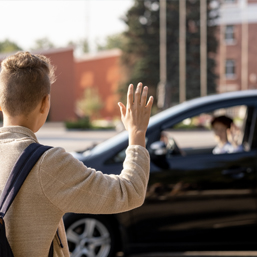
You’ve researched the best camps, packed their bags, and told them they will have fun, but you are still filled with worries about sending your child away to be cared for by others.
The good news is, it is healthy to have some fears about your child’s physical and emotional well-being while you are not around them. However, it is not healthy for anyone in the family if you excessively stress about it.
Here are some tips to help keep your concerns in check and not pass the fear onto your child before sending them out into the summer camp world.
Write it down
Parent consultant and founder of JFS Parent Education, Julie Freedman Smith, recommends that parents write down their fears. “When you know what your fears are, then you can deal with them,” she says. “Write them all down and explore which are real and who you trust to answer your questions about this.”
Worried that your child’s fear of water will not only interfere with their fun but could compromise their safety? Ask counselors or the camp director about their rules and schedules regarding swimming and boating. Stressed about how you would know if something bad happened? Ask what their parent communication policy is and give your input on the best way to get a hold of you. Thinking about how it may be difficult for your child to make friends? Ask if they can be put in a cabin with a child they know.
“’What ifs’ are good,” adds Julie. “Write them down and get them out of your head and make the decisions you need to make based on the information you gather.”
Get the facts
If you are concerned about the possibility of certain problems popping up, make sure you communicate with the camp staff and other sources. “When we are worried, we might be creating fears that aren’t even true,” says Julie. “Gather information from the camps, parents and other kids who have attended those camps. This will help you feel more in control of the situation and how to prepare for it.”
Create your own plan for what you will do in case of an emergency (injury, illness, storm) to put your mind at ease.
Know they’ve got this
As parents who have cared for our children since they were helpless babies, it can be difficult for us to realize or remember that by the time they are old enough to go to sleepaway camp, they are capable of many things.
“They will come back realizing they can do it,” says Julie. “It is setting them up for being away from family in the future.”
It’s true that you will not be there to put on their sunscreen or make sure they eat their vegetables, but they will get by and the camp staff is trained to help when needed.
Use your support system
Ask your friends and relatives who have sent their kids to camp any other questions you may have. What benefits did they see when they picked their kids up from their first summer camp? Discuss your concerns and emergency plan with your spouse and ask if they have anything to add or talk through.
Connect with parents of other campers at the same camp who are sure to be feeling some of the same fears you are. Maybe you met some at the open house or there is a social media page where you can share concerns and questions.
Focus on the good
There are many benefits to sending your child to camp. Improving social skills, increased independence, responsibility, self-esteem, building a sense of community… the list goes on and on. Add to these physical and mental skills like fishing, hiking, navigating outdoors, swimming, boating and more.
“Children develop new skill sets, get to make new friends, meet new people, are more active than they would be typically and are on screens less,” says Julie.
Try to keep in mind that by sending your child off to camp, they can come back stronger, smarter, and more independent than when they left. Reminding yourself of the reasons you are sending them to camp can help put your mind at ease.
Don’t avoid talking
“There is nothing wrong with sharing your concerns with your child,” says Julie. “If you are concerned, talking can be helpful. Ask them, ‘what would you do if this happened?’ or ‘who could you talk to about that?’”
She adds that it might be helpful to prepare children for what could happen rather than trying to avoid the fear entirely.
The worries you are experiencing regarding sending your child out to camp are normal, but it can also be harmful if they go unchecked. Now is the time to follow some of the advice you give to your child when they are worried about something. Taking the time to do the research and ask the right questions to the right people can help relieve any tensions you have and set you both up for camp success.
See our related articles:
Calgary’s Child Magazine © 2024 Calgary’s Child